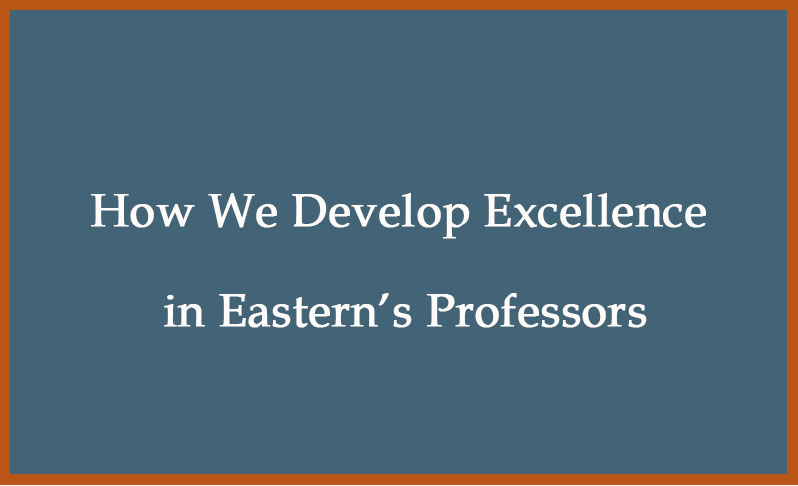If the assessment reports for your center of teaching & learning (CTL) indicated that you were reaching only 10% of your faculty, what would you do to improve those numbers?
If after including food, book give-aways, online registration, professional learning communities, and university-wide famous presenters, and even toolkits for the attendees, you found that you had bumped up the participation rate to 20-25%, would you be satisfied?
Consider an analogous classroom situation where the ideal participation rate is 100%, something instructors always shoot for (and sometimes attain). Unfortunately, a huge gap exists between what we accept in faculty development and what we attain in the classroom. While 100% participation in faculty development might be impossible, how do we position CTLs so that they are closer to reaching that goal?
Going DEEP: A Rationale for Developing Excellence in Eastern’s Professors
Surveyed faculty who did not show for professional development events often respond that while they wanted to attend that fascinating session on flipping the classroom, they are so jammed up by their teaching and service load that they don’t have time. Other faculty members reply that they teach a class at that time, so could we send them what was presented (a higher-up version of the student who misses class and shows up the next time with “Did I miss anything?”). Faculty may not be busier than they used to be, but they certainly perceive their situation as such. Another certainty is that faculty spend a lot more time on their computers/electronic devices than they did ten years ago.
A system for delivering professional development today must take into account the realities of how business handles an increased use of technology. We took our cue from cultural systems that provide entertainment and enlightenment. Satellite services such as DIRECTV and the Dish Network as well as cable companies (e.g., Time Warner Cable, Comcast) offer a new service to accommodate viewers who can’t be present for original broadcasts—an on-demand network. Missed the latest episode of NCIS or need to watch programming from three years ago to illuminate something you have just watched? Simply go to the on-demand archive. Likewise, busy teaching a class or putting the kids to bed, you can go to cyber-space to obtain what you missed.
And if you’ve ever visited a cable network’s repository of programming, what shows are in greatest demand? The highest rated. Check out, HGTV, for instance, and you’ll find the archives especially full for their most popular three shows—Fixer Upper, Flip or Flop, or Property Brothers. An online PD system, then, ought to provide access to the hottest pedagogical topics.
To develop our online PD system, DEEP (Developing Excellence in Eastern’s Professors), we created a survey for faculty to determine their greatest wants and needs, both the hottest topics and the foundations they needed for their pedagogies. For our inaugural online course, we chose a topic the faculty desired, metacognition, which was also the partial subject of our upcoming Quality Enhancement Plan (QEP) 2.0. As we had written a book on the subject, It Works for Me, Metacognitively (2016) and run several professional learning communities on the subject, we knew the topic well and could have guessed that subject would top any survey.
When we say “we,” the record needs to be clear. The three of us put together a workgroup with cross-campus representation, including two deans, the head of our e-campus system, an instructional designer, and some Faculty Innovators. The group met on a weekly basis for eight months right through the summer to produce the product that debuted on September 1.
Results
DEEP works much like a video game, allowing faculty members to complete various readings, viewings, and writing tasks in order to move up the designated levels that roughly correspond to Bloom’s revised taxonomy. The system even comes with a pre-test and a post-test so that participants can gauge their progress through the greater proficiencies. In essence, as we do in our PLCs and Teaching & Learning Innovations Series, we are helping faculty members acquire both knowledge and strategies to incorporate in their teaching.
Our campus has recently added a professional development area, and DEEP provides an easy method for faculty to obtain this PD when they want, and since records are kept, the faculty then have proof of their learning new and useful pedagogical skills.
As we say on our campus, if you need professional development, Go DEEP.
Author
 Dr. Russell Carpenter is director of the Noel Studio for Academic Creativity and Program Director of the Minor in Applied Creative Thinking at Eastern Kentucky University. He is also Assistant Professor of English. Dr. Carpenter has published on the topic of creative thinking, among other areas, including two texts by New Forums Press. In addition, he has taught courses in creative thinking in EKU’s Minor in Applied Creative Thinking, which was featured in the New York Times in February 2014. Meet Russell.
Dr. Russell Carpenter is director of the Noel Studio for Academic Creativity and Program Director of the Minor in Applied Creative Thinking at Eastern Kentucky University. He is also Assistant Professor of English. Dr. Carpenter has published on the topic of creative thinking, among other areas, including two texts by New Forums Press. In addition, he has taught courses in creative thinking in EKU’s Minor in Applied Creative Thinking, which was featured in the New York Times in February 2014. Meet Russell.



